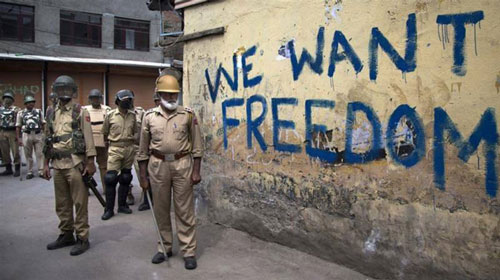Dr. Ghulam Nabi Fai
“United Nations support for the right to self-determination — while slower than it was at its historic peak in the twentieth century — remains both a source of pride for the Organization and a crucial pillar of its work going forward,” António Guterres, Secretary General of the United Nations. February 21, 2020.
“I encourage this committee (Special Committee on Decolonization” to ensure the self-determination of all colonial countries and peoples is implemented in accordance with the Charter of the United Nations.” Ambassador Volkan Bozkir, President, the United Nations General Assembly, October 14, 2020.
Self-determination leapt into common diplomatic parlance in the twentieth century with President Woodrow Wilson’s so-called “Fourteen Points.” They included a right to self-determination for all peoples. But on close examination and application, the concept seemed to approach meaninglessness. The critical deficiency was the failure to provide earmarks for identifying the universe of peoples who enjoyed the right. And the earmarks are far from intuitively obvious. Is it common language, culture, art, history, ethnicity, religion, folklore, or education? Nothing in the Wilsonian self-determination principle offered even a clue to an answer.
At the Paris Peace Conference, the Irish pleaded with President Wilson to insist that the British recognize their right to self-determination. The Irish enjoyed a common language, heritage, ethnicity, history, and had universally celebrated the 1916 Easter uprising and its dead martyrs. President Wilson, however, nixed the idea. He had larger aims in mind at Versailles, such as the ‘League of Nations’ and an ‘International Court of Justice’ which demanded British support. After a virtual civil war, the Irish gained self-determination in 1921, but sans the six counties of Northern Ireland which were predominantly but far from exclusively Protestant.
The Peace Conference also gave birth to Yugoslavia, composed of Serbs, Croats, Slovenes, Bosnians, Montenegrins, Macedonians, and Albanians. But there was no clear reason why self-determination did not justify seven nations instead of one. Indeed, post-Tito Yugoslavia quickly fractured into seven nations.
Czechoslovakia was another child of the Peace Conference, although Czechs and Slovaks were akin to oil and water. In 1992, they went their separate self-determination ways, and split into two discrete nations.
Self- determination is a principle that has been developed in philosophic thought and practice for the last several hundred years. It is an idea that has caused people throughout the world to rise up and shed the chains of oppressive governments at great risk.
Self determination, despite its ambiguities, has blossomed into a pivotal element in international relations in recent times. It has proven the key to resolving long festering disputes and unforgiving conflicts. Exemplary have been Namibia, East Timor, Bosnia, Eritrea. Kosovo, Montenegro, Southern Sudan, etc.—Kashmir Media Services










